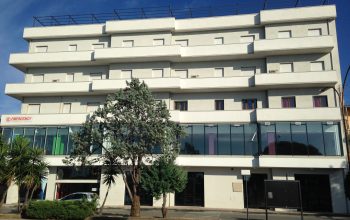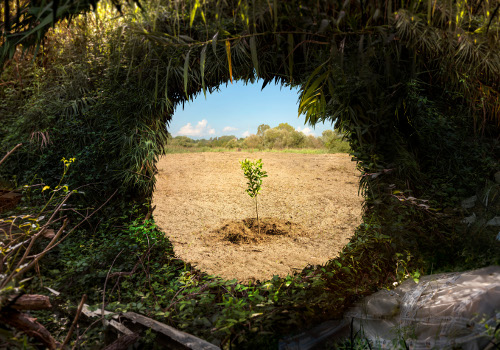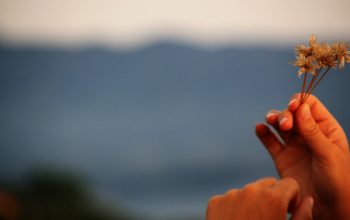THE BUILDING OF SOLIDARITY
27 September 2018
LiberaMente insieme: in Polistena, the symbol of criminal power becomes a place of hope and rebirth
Polistena (Reggio Calabria), September 17th, 1991: Sixteen armed men in four cars let loose hell outside the bar of the Versace clan. Two of three brothers were killed, the third played dead and saved himself. It was an act of war, the tragic response the powerful ’ndrine from the plain of Gioia Tauro reserve to those who dare challenge their undisputed dominance.
The place where the manslaughter occurred had an evocative name, that is “Bar 2001”, as if to symbolise the long-term power the Versace clan believed they could exercise over the town.
After the killing, at the beginning of the nineties, the bar changed its name into “au petit bijou”, but despite such a gentle sign, the little jewel, acts of violence were perpetrated in its basement against those who opposed the racketeering. The true nature of the clans’ business laid behind such an honourable front. The bar is not the only emblem of the family’s dominance, rather the building as a whole is the symbol of the Mafia’s power. The five-floor building overlooking Polistena was built in concrete “reinforced” by blackmailing: they made shady deals, built alliances and decided punishments in the building. A high school – a teacher training school – was also based there; huge halls where wedding celebrations were held, and the descendants of the clan glorified their social prestige and wealth with gargantuan feasts. People stood in a queue along the street to deliver their “envelope” to the newlyweds: A homage of mediaeval tradition some of the local people residing in the neighbourhood decided – whether intentionally or not – to give in to. It was a sort of life insurance, or at least a gesture keeping them away from troubles.
Unfortunately, the Versace’s bar was also one of the few meeting places where the young could spend their free time, ending up caught in the web of the gangsters. The alternative was street life but the situation was not different. That of Polistena and its building seems to be written history, a place where the only possible way was resignation. But things have changed since 2000’s. Continuous police operations made the clan’s power decline, while the building on Via Catena 43 was firstly seized and then confiscated.
Who would be so brave to use it – and to do what?
The institutions lingered on, so don Pino Demasi from the local parish made a first step. The commitment of volunteers and the social undertaking with the support of Fondazione CON IL SUD gave light to a project with the aim to turn that emblem of moral degradation into a place of solidarity that carries out actions at the benefit of migration and to fight against youth social distress. “LiberaMente insieme” started up in Polistena. The mafiosi still have their houses in the neighbourhood but the building – once the nerve centre of their shady business – is now a place devoted to legality, where activities are performed fully respecting social well-being, justice, recognition of people’s rights and needs. Floor-to-ceiling windows through which the ongoing projects can be seen from the street: A youth centre with a social purpose, together with a helpdesk for reception and assistance, vocational training workshops, the “Bottega dei sapori e dei saperi della legalità” (Atelier of flavours and knowledge of legality) where products from Valle del Marro and other Libera cooperatives are sold. The upper floors, right where the clans organised their wedding banquets, are now dedicated venues of multicultural integration; a restaurant and a youth hostel are there to host thousands of young volunteers who every year, make the choice of civic commitment and decide to work in the properties seized from the mafia.
In July 2013, Emergency set up an Outpatient Clinic on the second floor to deliver free healthcare assistance for the most deprived people and migrants. It is 350-square metre wide with two clinics dedicated to general medicine and three delivering dental and gynaecological services. The end users – on average, twenty a day – are mainly sub-Saharan and Eastern European nationals who reside in the tent villages of Rosarno and San Ferdinando. Many patients are farm workers employed in harvesting citrus fruits. The most frequent diseases are musculoskeletal disorders, dermatitis and gastro-intestinal disturbances, all caused by the difficult life and work conditions. Migrants are not the only one who require care, also resident households do. Physicians and nurses are assisted by cultural mediators, whose role is essential to overcome the barriers – not only language but also logistic and bureaucratic barriers – hindering access to medical care.
Together with Libera and Emergency, also the association “Il samaritano”, the foundation “Il cuore si scioglie” and the cooperative “libera terra Valle del Marro” are based in the building.
The new atmosphere of the “LiberaMente insieme” building is felt even out of it where the pieces of memory are put together. For years, the square in front of it had been dedicated to Giuseppe Valarioti, a teacher and the secretary of PCI, the Italian Communist party, who was killed by the Pesce clan in 1980, in the evening when the news that he had won the municipal elections spread, but no plate had ever been affixed in his memory. Now there is a writing on a signboard saying “Piazza Giuseppe Valarioti, vittima della mafia” (Giuseppe Valarioti Square, a victim of the mafia). This is also a strong sign of change that will hopefully involve more and more citizens from Polistena. “It is for them – don Pino Demasi says – that we created this social infrastructure. We are convinced that the neighbourhood will change. And it will come closer to this common house.” This involvement offers also the chance of working at the activities carried out in the building and in the lands confiscated from the Mafia through work placements. Real jobs for migrants and young people who will be appropriately trained. Occupation through the confiscated properties to dismantle the hideous myth of the Mafia giving job opportunities. “The Mafia gives no job” a young boy from Don Pino’s parish says “because work is a right and the Mafia recognizes no right at all. Mafia really turns work into mere back-scratching and blackmailing.” So, the entire LiberaMente insieme building has become an example of good practice of the fight against the Mafia, and in 2014, was visited by the representatives of the Italian government and institutions, namely the Deputy Minister Filippo Bubbico and the Minister Carmela Lanzetta, the Prefect of Reggio Calabria Claudio Sammartino, the Public Prosecutors of Reggio Calabria and Palmi, Federico Cafiero de Raho and Giuseppe Creazzo, Quaestor Guido Longo, the district commanders of Carabinieri and Guardia di Finanza. The Deputy Minister Bubbico declared that “such projects and undertaking will be supported to demonstrate that transparent and legal productive processes can generate wealth.” The building in Polistena has become an international example and has been visited by the representatives of 70 UN member States. Experts and the representative of the member States’ governments, Armed Forces and the Italian Magistracy, members of international organisations and scholars met here with the objective of “exporting” the Italian sensitivity of the anti-mafia legislation: From Korea to Bulgaria, from Tanzania to Australia, from the USA to Qatar, from Indonesia to Mexico. The entire world has examined the case of the place that has turned from the symbol of the criminal power into the building of solidarity.
From the book “CON IL SUD – #unfuturomaivisto. Visioni e storie di un’Italia che può cambiare”, edited by Andrea Di Consoli and Yari Selvetella, published by Mondadori, 2016
LiberaMente insieme: in Polistena, the symbol of criminal power becomes a place of hope and rebirth
Polistena (Reggio Calabria), September 17th, 1991: Sixteen armed men in four cars let loose hell outside the bar of the Versace clan. Two of three brothers were killed, the third played dead and saved himself. It was an act of war, the tragic response the powerful ’ndrine from the plain of Gioia Tauro reserve to those who dare challenge their undisputed dominance.
The place where the manslaughter occurred had an evocative name, that is “Bar 2001”, as if to symbolise the long-term power the Versace clan believed they could exercise over the town.
After the killing, at the beginning of the nineties, the bar changed its name into “au petit bijou”, but despite such a gentle sign, the little jewel, acts of violence were perpetrated in its basement against those who opposed the racketeering. The true nature of the clans’ business laid behind such an honourable front. The bar is not the only emblem of the family’s dominance, rather the building as a whole is the symbol of the Mafia’s power. The five-floor building overlooking Polistena was built in concrete “reinforced” by blackmailing: they made shady deals, built alliances and decided punishments in the building. A high school – a teacher training school – was also based there; huge halls where wedding celebrations were held, and the descendants of the clan glorified their social prestige and wealth with gargantuan feasts. People stood in a queue along the street to deliver their “envelope” to the newlyweds: A homage of mediaeval tradition some of the local people residing in the neighbourhood decided – whether intentionally or not – to give in to. It was a sort of life insurance, or at least a gesture keeping them away from troubles.
Unfortunately, the Versace’s bar was also one of the few meeting places where the young could spend their free time, ending up caught in the web of the gangsters. The alternative was street life but the situation was not different. That of Polistena and its building seems to be written history, a place where the only possible way was resignation. But things have changed since 2000’s. Continuous police operations made the clan’s power decline, while the building on Via Catena 43 was firstly seized and then confiscated.
Who would be so brave to use it – and to do what?
The institutions lingered on, so don Pino Demasi from the local parish made a first step. The commitment of volunteers and the social undertaking with the support of Fondazione CON IL SUD gave light to a project with the aim to turn that emblem of moral degradation into a place of solidarity that carries out actions at the benefit of migration and to fight against youth social distress. “LiberaMente insieme” started up in Polistena. The mafiosi still have their houses in the neighbourhood but the building – once the nerve centre of their shady business – is now a place devoted to legality, where activities are performed fully respecting social well-being, justice, recognition of people’s rights and needs. Floor-to-ceiling windows through which the ongoing projects can be seen from the street: A youth centre with a social purpose, together with a helpdesk for reception and assistance, vocational training workshops, the “Bottega dei sapori e dei saperi della legalità” (Atelier of flavours and knowledge of legality) where products from Valle del Marro and other Libera cooperatives are sold. The upper floors, right where the clans organised their wedding banquets, are now dedicated venues of multicultural integration; a restaurant and a youth hostel are there to host thousands of young volunteers who every year, make the choice of civic commitment and decide to work in the properties seized from the mafia.
In July 2013, Emergency set up an Outpatient Clinic on the second floor to deliver free healthcare assistance for the most deprived people and migrants. It is 350-square metre wide with two clinics dedicated to general medicine and three delivering dental and gynaecological services. The end users – on average, twenty a day – are mainly sub-Saharan and Eastern European nationals who reside in the tent villages of Rosarno and San Ferdinando. Many patients are farm workers employed in harvesting citrus fruits. The most frequent diseases are musculoskeletal disorders, dermatitis and gastro-intestinal disturbances, all caused by the difficult life and work conditions. Migrants are not the only one who require care, also resident households do. Physicians and nurses are assisted by cultural mediators, whose role is essential to overcome the barriers – not only language but also logistic and bureaucratic barriers – hindering access to medical care.
Together with Libera and Emergency, also the association “Il samaritano”, the foundation “Il cuore si scioglie” and the cooperative “libera terra Valle del Marro” are based in the building.
The new atmosphere of the “LiberaMente insieme” building is felt even out of it where the pieces of memory are put together. For years, the square in front of it had been dedicated to Giuseppe Valarioti, a teacher and the secretary of PCI, the Italian Communist party, who was killed by the Pesce clan in 1980, in the evening when the news that he had won the municipal elections spread, but no plate had ever been affixed in his memory. Now there is a writing on a signboard saying “Piazza Giuseppe Valarioti, vittima della mafia” (Giuseppe Valarioti Square, a victim of the mafia). This is also a strong sign of change that will hopefully involve more and more citizens from Polistena. “It is for them – don Pino Demasi says – that we created this social infrastructure. We are convinced that the neighbourhood will change. And it will come closer to this common house.” This involvement offers also the chance of working at the activities carried out in the building and in the lands confiscated from the Mafia through work placements. Real jobs for migrants and young people who will be appropriately trained. Occupation through the confiscated properties to dismantle the hideous myth of the Mafia giving job opportunities. “The Mafia gives no job” a young boy from Don Pino’s parish says “because work is a right and the Mafia recognizes no right at all. Mafia really turns work into mere back-scratching and blackmailing.” So, the entire LiberaMente insieme building has become an example of good practice of the fight against the Mafia, and in 2014, was visited by the representatives of the Italian government and institutions, namely the Deputy Minister Filippo Bubbico and the Minister Carmela Lanzetta, the Prefect of Reggio Calabria Claudio Sammartino, the Public Prosecutors of Reggio Calabria and Palmi, Federico Cafiero de Raho and Giuseppe Creazzo, Quaestor Guido Longo, the district commanders of Carabinieri and Guardia di Finanza. The Deputy Minister Bubbico declared that “such projects and undertaking will be supported to demonstrate that transparent and legal productive processes can generate wealth.” The building in Polistena has become an international example and has been visited by the representatives of 70 UN member States. Experts and the representative of the member States’ governments, Armed Forces and the Italian Magistracy, members of international organisations and scholars met here with the objective of “exporting” the Italian sensitivity of the anti-mafia legislation: From Korea to Bulgaria, from Tanzania to Australia, from the USA to Qatar, from Indonesia to Mexico. The entire world has examined the case of the place that has turned from the symbol of the criminal power into the building of solidarity.
From the book “CON IL SUD – #unfuturomaivisto. Visioni e storie di un’Italia che può cambiare”, edited by Andrea Di Consoli and Yari Selvetella, published by Mondadori, 2016


